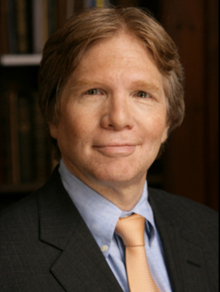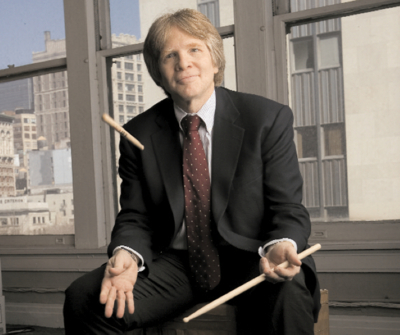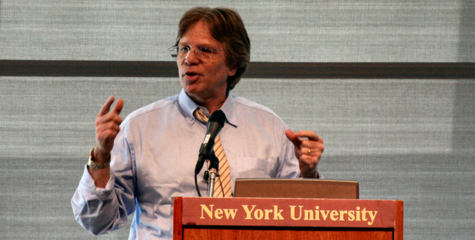
- Learn from one of the top angels in NYC – David S Rose
- Hear What David S Rose Thinks About Jason Calacanis’s Anti-Angel Payment Rants
- Find Out How David S Rose Got His Start As An Angel Investor
Full Interview Audio and Transcript
Personal Info
Hobbies and Interests: Letterpress printing, Trains.
Sports teams: Yankees.
Favourite Books:
- Three Moves Ahead by Bob Rice
- Outliers by Malcolm Gladwell
- Presentation Zen by Garr Reynolds
Favourite Entrepreneurs: father, entrepreneurs he works with.
Twitter url: http://twitter.com/davidsrose
Personal blog: http://rose.vc/angelnotes
Company website: http://www.rose.vc/
Fast Track Interview
Adrian Bye: Today I have the pleasure of talking with David S. Rose. He’s considered the number one angel investor in New York City. David, thanks for joining us. Can you tell us about who you are and what you do?
David S. Rose: I regard myself primarily as an entrepreneur and secondarily as an angel investor. My background is what you would expect for an entrepreneur: it has nothing to do with anything I’m doing! I have a degree in Urban Planning from Yale, and I worked in politics until I realized I was an entrepreneur at heart. I earned an MBA in Finance and spent 10 years in my family’s real estate development business. I started playing around with computers along the way, and I created the world’s first computerized real estate sales office around 1982.
Adrian Bye: Amiga or Commodore 64?
 David S. Rose: I was an Apple guy. I had an Apple II in 1979 then moved to an Apple III. After the Mac came around and I went to the first Macworld Trade Show, and all the people that I had known in the online world were doing these start-ups. I thought that was cool and wanted to get involved. We wrote WristMac, software that tied together your Mac with a Seiko watch that had 2K of RAM and a serial port.
David S. Rose: I was an Apple guy. I had an Apple II in 1979 then moved to an Apple III. After the Mac came around and I went to the first Macworld Trade Show, and all the people that I had known in the online world were doing these start-ups. I thought that was cool and wanted to get involved. We wrote WristMac, software that tied together your Mac with a Seiko watch that had 2K of RAM and a serial port.
We moved onto paging software, and became the largest developer of wireless messaging software for all the major companies. At this point I was doing tech stuff full-time. We created one of the first wireless data networks, AirMedia Live! The network had a hardware device that plugged into your serial port. It would push information to your computer even though you weren’t online, stuff like CBS SportsLine and PCQuote. Venture capital began to flow in, and by the mid-90s, the company had about 120 people on both coasts. Then the product shipped…and we crashed and burned. We had a spectacular product that everybody loved, but nobody bought.
At that point, we had an extraordinary infrastructure. We went to our investors and said, “We can leverage this with the Internet. Let’s be a back-end for the wireless Internet, whether you’re using SMS, text, XML, or voice.” We hit the boom at the right time. The next thing you know, we had venture capital from people like Richard Branson, we had offices in London and Paris, things were going really well. The only thing that could possibly have hurt us was if everything crashed and burned at once. Unfortunately, that’s what happened.
My wife said, “Enough is enough.” I left the tech world for six months or so. Then this young guy I knew, Andrew Weinreich, came along. He had invented social networking with the web site sixdegrees.com, and he was back out on the street after the crash. He had a plan for Joltage, a distributed Wi-Fi network. I advised him and invested a few dollars into getting started. The next thing you know, we’re off to the races again. But we were in the middle of the “nuclear winter,” as we called it in the angel world. We couldn’t get any VCs to finance anything and Joltage quietly closed down.
But now I knew you could lose money both as an entrepreneur and investor! I did some small investments through a local angel group to start, and then a number of us founded New York Angels. We wrote up the business plan as a not-for-profit, as my wife wouldn’t let me start a company. Now I was investing on a more or less full-time basis.
I quickly realized how difficult it was to review hundreds of funding applications each year. I had searched everywhere for tools to bring angel investors and early-stage entrepreneurs together. I started Angelsoft to fill this market hole. Angelsoft provides the back-end infrastructure for virtually every angel investment group in the world. Over 20,000 accredited investors use the platform to process over 3,000 business plans a month. I’m actively investing in a dozen or more companies every year here in New York, and I’ve set up an incubator and a co-working space. I’m working 17-hour days, 7 days a week and having the time of my life.
Adrian Bye: Tell us about angels, and how it all works?
 David S. Rose: Sure. Most people think all financing is in one big pot. People often say “angelsandVCs,” like it’s one word without spaces. But there is a big difference. VCs are professional money managers who raise a fund of other people’s money, and invest millions in a start-up company.
David S. Rose: Sure. Most people think all financing is in one big pot. People often say “angelsandVCs,” like it’s one word without spaces. But there is a big difference. VCs are professional money managers who raise a fund of other people’s money, and invest millions in a start-up company.
In contrast, angel investors are individuals who invest their own money into early-stage companies. Angels usually invest from the tens of thousands to the low hundreds of thousands. Angel investors invest earlier in the cycle, when companies are just starting up, whereas VCs tend to invest later on when they have more traction. Angels essentially bet on the entrepreneur. Most angels have some personal experience in entrepreneurship, and they often add value to the start-up by offering advice, networking, and sometimes even management.
Back in the 90s, as all of these individuals were investing in companies, and they’d bump into each other. They started to loosely organize, pooling their money together. That was the origin of angel groups. When you get a hundred people into a group all sharing their deal flow, expertise, and money, you get a lot more reach.
Adrian Bye: As an angel it seems like you are taking most of the risk. Honestly, how good are the returns as an angel investor?
David S. Rose: It’s partly art, science, and a lot to do with portfolio diversification. Nobody can pick early-stage companies correctly even a majority of the time. Most angel investments fail completely.
If you do 10 investments you should expect that two or three of them are going to wipe out within the first year or so. Two of them may fail a few years later. Maybe another two will give you back the money you put in. Then two more might be bought by a larger company and will return two or three times your money. Your whole portfolio ends up riding on one company, which you hope to be a real home-run, with a 20 to 30 times return on your investment. With the money from that one company in ten, professional angel portfolios over time tend to have an IRR in the 20 to 30% range, which is actually quite good.
Adrian Bye: You’ve probably seen Jason Calacanis talking about “pay-to-present” groups. I’m interested in your thoughts on that area.
David S. Rose: I’ve known Jason for 20 years. He’s against angels or angel groups who charge entrepreneurs to pitch. Jason doesn’t do nuance, and the reality is there is some nuance here. Some ‘groups’ will charge $10,000 or more for a company to have the “opportunity” to present their pitch to a room full of people. These guys are making money on the backs of entrepreneurs who don’t have much of a chance of being funded. But at the other extreme you have not-for-profit angel groups charging very small amounts, $100 or so, to defray their expenses. The Angel Capital Association has established a total fee limit of $500. Any group in the Angel Capital Association shouldn’t charge more than $500 in total to entrepreneurs throughout the whole process.
Jason has gotten a lot of blog readership out of this, partly because there are always a lot of new entrepreneurs. I liken the analogy to “fish swimming in a fast-moving river.” Everyday there are new fish swimming down that river. Everyday the fishermen-investors come to the same bank. An entrepreneur who isn’t familiar with the market may look at a web posting that says, “If you pay us $15,000, we will put you in front of all the people who will give you lots of money.” Jason is trying to warn people who don’t know better, that they have almost zero chance of getting funded.
What we’re trying to do with Angelsoft is to provide a standardized way of reducing costs across the whole board and making everything transparent. You can look up New York Angels and see exactly what happens and when. How much money we’ve funded over what timeframe, average time to look at a deal, average time to funding, etc.
Adrian Bye: You have your angel network locally, and Angelsoft is used around the world. You must have a big reach into the best deals.
 David S. Rose: Not necessarily. Angelsoft is a platform that provides backend infrastructure for all the world’s angel groups and I don’t have any special access to any group’s deals other than my own. However, we do have an area called Open Deals, where angel groups looking to syndicate deals can post, “Hey, we’ve got part of this deal financed. Who’d like to join us?” Entrepreneurs can also post there and potentially be seen by all 20,000 investors. So anyone can broaden their reach and deal flow with Angelsoft.
David S. Rose: Not necessarily. Angelsoft is a platform that provides backend infrastructure for all the world’s angel groups and I don’t have any special access to any group’s deals other than my own. However, we do have an area called Open Deals, where angel groups looking to syndicate deals can post, “Hey, we’ve got part of this deal financed. Who’d like to join us?” Entrepreneurs can also post there and potentially be seen by all 20,000 investors. So anyone can broaden their reach and deal flow with Angelsoft.
Adrian Bye: Most of the stories you told were pretty horrendous! It sounds like a lot of stuff went wrong, and now you’ve managed to pull it together. Can you talk a bit about that?
David S. Rose: When AirMedia went down it was the single biggest disappointment of my life at that point. I cried myself to sleep. But you pick yourself up and do it again. The most important thing is to maintain your integrity, never sell out, and do the right thing. Every entrepreneur will fail. You don’t set out to fail, but one failure doesn’t mean you pack it up. You keep going, learn from your mistakes, and try again.
So the question is, “Why do you do this?” One thing I’ve found is that entrepreneurs are crazy. The average angel investor has previously had over 10 years experience as an entrepreneur. So angel investors typically are *distilled* craziness. I live these days in a world of crazies on both sides and I’m certainly part of that. You have to know that this is what you want to do. It’s a calling.
I do a lot of talking and teaching about entrepreneurship. I was Mentor of the Year last year at NYU’s Stern Business School, and I’m on the entrepreneurship advisory boards at my alma maters, Columbia and Yale. The first thing that you let every wannabe entrepreneur know is: bad stuff will happen, absolutely guaranteed. When it happens, it happens to you.
Business school students come by my office and ask, “Should I be a venture capitalist? or Should I be an entrepreneur?” I tell them, if you’re asking that question, you already know the answer, because otherwise you would have started a company! If you’re an entrepreneur, you have the drive, and you have to do this. No matter how many times you’re punched down, you’ll get up and you’ll try it again. That’s what entrepreneurship is about.
Adrian Bye: Tell us about your incubator co-working space.
David S. Rose: I wanted to be close to the companies in which I invested. Some of them only have a few people. I opened an incubator where they could get office space and be near me so I can provide advice. Then we had other people wanting space, so we decided as long as they are good guys in the tech space, they can come in, too.
It is getting less and less expensive to start companies. You can start a cloud-based company really cheaply with one person and a cat. You can do it in Starbucks, but there’s a trend of low-cost co-working spaces where you can spend time, with Internet, phones and everything else.”
Adrian Bye: Does that include the cats as well?
 David S. Rose: No, it doesn’t include the cats, but one company has a hamster, and we have a couple of dogs. We have about 15 companies total. They’re in varying stages. People working towards the point where they are ready to approach angels, all the way up to venture-backed companies with small teams. New York Angels also has its offices here, as does Astia, the international nonprofit that helps women-owned entrepreneurial businesses. We have maybe 75 people across the whole operation.
David S. Rose: No, it doesn’t include the cats, but one company has a hamster, and we have a couple of dogs. We have about 15 companies total. They’re in varying stages. People working towards the point where they are ready to approach angels, all the way up to venture-backed companies with small teams. New York Angels also has its offices here, as does Astia, the international nonprofit that helps women-owned entrepreneurial businesses. We have maybe 75 people across the whole operation.
Adrian Bye: You have 75 guys churning out ideas for businesses they’re trying to start?
David S. Rose: 20 or so are on Angelsoft, doing our back-end platform. One floor was taken over by a startup. An angel investor came in for space, then had a startup, and now they’re a full floor. Then we have a couple of floors of incubator and co-working space.
Adrian Bye: You’ve also had one or two entrepreneurs in residences.
David S. Rose: Right. The EIR, Entrepreneur-in-Residence is designed to help the entrepreneurs in the building, as well as help manage it.
Our first Entrepreneur-in-Residence was Nate Westheimer. He was a young entrepreneur and his first startup didn’t work out. When it closed down, I invited him to be our full time EIR for the incubator. He helped the entrepreneurs as well as the larger community. Later he was elected as the Organizer of the NY Tech Meetup and then took a full-time job as VP of product development at AnyClip.
Ryan Janssen succeeded Nate. After five years of helping build Angelsoft, he decided to start his own company. He spent half a year as our EIR during which time he founded Set Jam, which does really cool stuff in the online video space.
Now we have an EIT, an “Entrepreneur-in-Training”. A young guy named Bo Bell was finishing up his Ph.D. and was looking for something to do in the tech space. After talking to him for 10 minutes, I said, “Wait a minute! This guy is an entrepreneur and doesn’t know it. He has all the spark, passion, self-sufficiency.” Sort of like Henry Higgins and Liza Doolittle. Bo just started as our Entrepreneur-in-Training. All the entrepreneurs in the building are going to help mentor him and he’s going to blog about it. Hopefully, he can teach by learning. As he learns the ropes of being an entrepreneur, other people can learn alongside him by reading his blog in addition to providing advice. So we’ll see how that works out.
Adrian Bye: I want to ask one last question. You’ve mentioned the tech scene is taking off in New York. What do you think would happen to the tech community if and when Wall Street comes back?
David S. Rose: I don’t believe it’s solely the downturn that freed up competition for programming talent. New York is developing the ecosystem for early-stage and venture-funded tech startups. All kinds of things are happening as a result of the growth of the indigenous tech community in New York.
People will always want to participate in the entrepreneurial startup world, with the promise of exciting work and large paydays. Angel investors are a wonderful source of financing, and we’re seeing in them an increasing understanding of the high-tech startup world. Things like Angelsoft, Angel Capital Association, and courses on how to raise funds are helping standardize angel investing around the world and make the process more transparent. This is a great time to be either an entrepreneur and an angel investor so whichever way you go, we’re in for some very exciting times.









